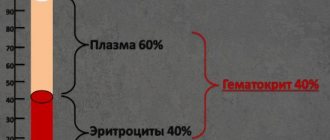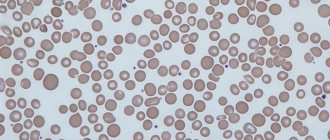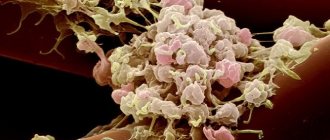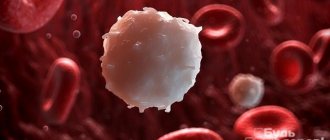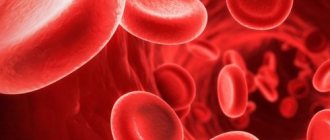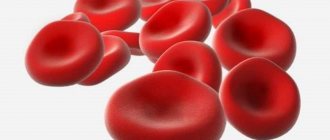Pyelonephritis
Diabetes
Hepatitis
Rheumatism
17314 October 27
IMPORTANT!
The information in this section cannot be used for self-diagnosis and self-treatment.
In case of pain or other exacerbation of the disease, diagnostic tests should be prescribed only by the attending physician. To make a diagnosis and properly prescribe treatment, you should contact your doctor. We remind you that independent interpretation of the results is unacceptable; the information below is for reference only.
Urea in the blood: indications for prescription, rules for preparing for the test, interpretation of the results and normal indicators.
How does urea appear in the blood?
Urea in a biochemical blood test is an important indicator of the functional capacity of the kidneys. After the breakdown of proteins, ammonia is formed, which is toxic to the body. The liver synthesizes urea, or carbamide, from it, which is transported through the blood to the kidneys. Here it is filtered and excreted in the urine.
Urea is called this way because it was first isolated from urine. It was later discovered in other substances. The discoverer of urea is the French chemist Hilaire Maren Ruel (18th century).
The breakdown of proteins also produces creatinine, but this occurs inside the muscles. After this, the substance enters the blood and is excreted in the urine.
Thus, creatinine and urea make it possible to judge protein metabolism and the state of the urinary system. If the values are outside the normal range, it may indicate other serious pathologies.
Urea is sometimes confused with uric acid. Uric acid is a completely different substance, the result of the breakdown of purine bases under the influence of enzymes.
Treatment methods
Treatment methods are correlated with the underlying cause:
- for liver pathology - hepatoprotectors: Karsil, Essentiale;
- for kidney pathology - symptomatic treatment under the supervision of a nephrologist;
- in case of dehydration - restoration of the normal volume of circulating blood and electrolytes;
- postoperative complications resolve over time;
- changes in hormonal levels are corrected independently for physiological reasons or with special drugs that relieve the pathology of the relevant organs;
- protein deficiency can be corrected by changing the diet (butter, meat, eggs);
- intoxication of a specific origin - by quitting smoking and alcohol.
Normalization of the level of this nitrogen-containing substance is achieved with medications and methods of artificially purifying the blood of toxins. Sorbents that remove toxins reduce the concentration of urea in the blood serum: Polysorb (240 rubles), Atoxil (150 rubles), Enterosgel paste (230 rubles), Silix (190 rubles). These drugs are effective in the initial stages of pathology of the liver, kidneys, and gastrointestinal tract. At the stage of uremia, chronic renal failure, hardware methods are needed: hemodialysis on an artificial kidney machine in the nephrology department or dialysis center.
The blood purification procedure is carried out by highly qualified specialists. The patient is placed on a special chair, and a medical device is connected to his blood supply system, which removes urea and other toxins using a bicarbonate or acetate solution. The procedure is performed under sterile conditions with disposable consumables.
When do you need to take a biochemical blood test?
Urea in a blood test prescribed during a regular medical examination is not a mandatory indicator. Therefore, to determine the level of urea, blood biochemistry is taken. Typically, such an analysis is carried out on the recommendation of a doctor.
The prerequisite for referral for blood biochemistry is often general malaise (headache, constant fatigue), which is soon supplemented by symptoms of liver or kidney failure:
- too frequent urge to urinate or, conversely, a sharp reduction in their number;
- noticeable changes in urine quality (color, impurities, foam);
- nausea;
- swelling;
- bleeding;
- the appearance of uremic frost on the skin (discharge in the form of whitish powder);
- convulsions.
Based on the results of the analysis, one can judge the performance of the kidneys, how well they cope with filtering blood and removing metabolic products. The indicators will also indicate the condition of the liver, especially its detoxification function. If your urea level is outside the normal range, it may accompany heart disease or other serious illnesses.
Reasons for the increase
There are a huge number of factors for level growth. It is worth mentioning only the main ones so that the fundamental possible points become clear:
- Kidney failure.
- Urolithiasis disease.
- Tumors of excretory tract structures.
- Bleeding.
- Infectious processes.
- Burns.
- Severe injuries with disruption of tissue integrity.
- Dehydration.
- Taking a group of drugs. Especially long-term or without control of the regimen and dosage.
- Heart pathologies.
- High blood pressure levels.
If urea is higher than normal, in most cases this is an indication of disorders of the liver, kidneys, and cardiac structures. Other options are possible. We urgently need to figure it out.
There are also natural factors, but they are assumed last, so as not to make a fatal mistake.
All the reasons for the increase in urea concentration are described in detail in this article.
How to prepare and how the analysis is carried out
To take a urea test, you need preliminary preparation:
- After discussion with your doctor, you should avoid taking medications that could interfere with your blood test results.
- You should not drink alcohol the day before. Try to reduce physical and mental stress as much as possible.
- You need to come to the laboratory in the morning on an empty stomach.
- In the morning before the test, you should not drink anything other than plain still water.
- The last meal should be no later than 12 hours before the test.
- You should not smoke 1 hour before taking blood.
The procedure itself does not take much time. The forearm is tied with a tourniquet to delay the movement of venous blood. After a couple of minutes, when the vein becomes clearly visible, it is punctured and blood is drawn, after wiping the injection site with alcohol.
The results of a biochemical blood test are issued the next day.
Treatment options for high urea levels
If a laboratory blood test reveals hyperuricemia, the doctor prescribes the necessary examinations to clarify the diagnosis and prescribe medications depending on the pathology being diagnosed.
During treatment, the patient is recommended to follow a low-protein diet that excludes or limits the following foods:
- meat and sausage;
- liver, kidneys and tongue;
- eggs, dairy products;
- peas and beans;
- baked goods and sweets;
- fried, smoked and spicy foods;
- alcohol.
It is necessary to enrich the diet with grain porridges cooked in water, fruits and vegetables, and berries. For drinks, it is recommended to consume freshly prepared juices and rose hips.
During this period, you need to reduce physical activity to a minimum and avoid nervous strain.
If a problem arises due to uncontrolled use of medications, the doctor adjusts the therapy by reducing the dose of the drug or completely eliminating it or replacing it with another medication. Diuretic teas or herbal decoctions are prescribed as diuretics.
Urea standards
The normal level of urea in the blood of men is in the range of 3.7-8.3 mmol/l. In the female body, the blood contains slightly less carbamide. This is due to less muscle mass and less physical activity. A good indicator is considered to be 2.5-6.7 mmol/l. The levels of urea in the blood of women during pregnancy are even lower due to the acceleration of the processes of protein formation and their elimination.
In children, the level of urea in the blood is normal at 1.9-6.5 mmol/l. For newborns, an increase in this value is considered normal.
With age, the filtration capacity of the kidneys weakens, so a level of 3.2-7.8 mmol/l after sixty years is considered an indicator of a healthy person.
What does increased performance mean?
An increased level of urea in the blood is not always an indicator of a pathological condition. This may be the result of increased physical activity, excessive consumption of protein foods, prolonged fasting, lack of water, stress, or taking certain medications (sulfonamides, antibiotics, blood pressure medications, corticosteroids).
An increase in indicators indicates an accelerated breakdown of protein or a violation of its excretion. Prolonged stay in this state provokes negative consequences and can even lead to loss of ability to work.
A lot of urea in the blood is observed with changes in the glomerular filtration rate caused by inflammation due to bacterial infection (pyelonephritis, glomerulonephritis), replacement of renal connective tissue (nephrosclerosis). Sometimes it indicates the formation of stones or tumors in the urine outflow path.
The reasons for the increase in urea in the blood may lie outside the urinary system:
- diseases of the liver, pancreas, heart;
- hormonal disorders;
- malignant formations of any localization;
- external or internal bleeding.
Causes of decreased urea in the blood
A decrease in urea levels may be observed in the blood serum. This condition is also not considered satisfactory. If the analysis shows that urea is below normal, this means that the body is not receiving enough protein due to a low-protein diet. There is simply nothing to synthesize it from.
There is less urea in the blood after hemodialysis.
Low urea accompanies liver diseases (hepatitis, cirrhosis, poisoning), fever.
Carbimide in the blood becomes less during pregnancy, since protein breakdown reactions occur much faster.
If the levels are reduced, you will need to consult a urologist, because we are talking about a disorder of protein metabolism with possible negative consequences.
What causes low urea levels?
Basically, a sharp decrease in urea content is explained by diseases that attack liver cells. This group includes all types of cirrhosis, hepatitis, polycystic disease, hepatosis, liver failure, fibroma, hepatocellular carcinoma, hemangioma, phosphorus or arsenic poisoning.
No less common causes of low urea are helminthic infestation, malabsorption (improper absorption of nutrients in the gastrointestinal tract), as well as chronic pancreatitis.
Sometimes a failure in the endocrine system provokes the same lack of urea. Mostly we are talking about dysfunction of the pituitary gland (acromegaly) and the thyroid gland (hypothyroidism).
Uncontrolled consumption of water on a regular basis can lead to hyperhydration (water oversaturation of the body), which helps reduce the concentration of urea in the blood. Biochemical analysis sometimes registers a deficiency of carbonic acid diamide if the patient is an adherent of protein-free diets, strength training and vegetarianism.
During the period of hemodialysis (hardware purification of blood outside the renal system), a completely natural, stable lack of urea will be observed.
It is necessary to recall the existence of drugs that reduce carbamide without harm to human health. The most popular products of this profile include Insulin Lizpro, Chitosan (biological supplement), Somatropin (growth hormone), Hepa-Merz, etc.
Urea in the blood is low, and urea is high in the urine, and other options
The level of urea in the blood is directly related to the amount of protein food eaten. With excess consumption of protein-containing foods, the amount of broken down protein increases, after which more urea is synthesized. To reduce the amount of urea in the blood, the kidneys begin to work more actively, and the level of the substance in the urine, as a result, increases.
Poisoning with hepatotropic poisons, such as phosphorus and arsenic, leads to a decrease in the synthesis of urea by the liver. As a result, the blood contains much less urea.
An increased level of the substance in the urine indicates an excess of protein when the kidneys are working hard to remove it from the body. This condition is observed after a high fever, surgery, with increased thyroid function, or pernicious anemia.
Side effects
Parenteral use of Urea may be accompanied by the following side effects:
- A short-term increase in the concentration of residual nitrogen in the blood (in the first hours after administration);
- Nausea, heartburn, vomiting;
- Thirst, dry mouth;
- Increased blood pressure, increased heart rate;
- Headache, dizziness, drowsiness, weakness, confusion, fever;
- Electrolyte imbalance;
- Subdural or subarachnoid bleeding;
- Venous thrombosis, phlebitis at the injection site.
When used externally, increased itching, redness of the skin, and allergic reactions are possible.
Possible complications
An increased level of urea is dangerous because prolonged exposure to this state leads to acute or chronic uremia - poisoning by products of protein metabolism. If uremia is not treated, uremic coma can occur.
Gastric juice can accumulate excess urea, causing gastritis and colitis. These diseases are accompanied by vomiting and bloody diarrhea.
Possible disorders of the central nervous system:
- fatigue;
- insomnia;
- convulsions;
- breathing problems;
- deterioration of vision up to blindness.
How to treat
After realizing the problem, the question becomes acute of how to remove excess urea. First of all, it is necessary to find out the cause of this imbalance in order to eliminate it. Only a doctor should do this, since mistakes made as a result of self-medication can be too serious. You will also need to do a repeat blood test.
You need to adjust your diet, which no medications can do. Medications and traditional medicine will help normalize the level of the substance in the blood.
In severe cases, sometimes the only solution is hemodialysis or a kidney transplant.
Drugs
There are several groups of drugs used to normalize carbamide levels:
- diuretics (Furosemide, Chofitol), but they are not allowed to be prescribed for stones or tumors;
- sorbents (Polysorb, Entegnin) reduce intoxication;
- sedatives (Novo-Passit, Valocordin) relieve stress;
- intravenous administration of glucose lowers urea levels.
Diet
To lower blood urea levels, you need to limit your intake of protein-rich foods. The menu should be enriched with fresh products: herbs, vegetables, fruits. Rosehip decoction has a good healing effect on the body. You can drink it regularly. Fresh juices work well. It is advisable to cook porridge in water. Alkaline waters reduce the level of urea.
To raise the amount of urea to a normal level, you will need to diversify your daily diet with a large number of foods containing protein: meat, fish, eggs, dairy products. It is advisable to boil or fry the meat. With this method of cooking, protein is better absorbed.
If, in addition to abnormal urea levels, there are problems with the stomach or pancreas, it is better to discuss the choice of dishes and the method of preparing them with your doctor.
Folk remedies
In the arsenal of traditional medicine there are many tips for reducing the amount of urea in the blood.
- Cowberry. Pour 2 tablespoons of lingonberry berries and leaves with a glass of boiling water, boil for 3-5 minutes, leave for another 15 minutes. The amount obtained after filtering is divided into two doses per day.
- Green bean. Wash the raw beans and chop them. Pour 3 tablespoons of raw material into 1.5 cups of boiling water. Boil for 20 minutes. The beans need to be left for another two hours, then strained. Drink half a glass of the prepared broth 30 minutes before meals three times every day.
- Nettle. Wash fresh nettles, chop and squeeze out the juice. Take 1 teaspoon three times a day.
Whatever the reason for the urea level to go beyond the normal range, it should never be ignored. Any disease detected at an early stage is easier to treat and does not lead to serious consequences.
Increased level
Urea in a biochemical blood test may be elevated. A number of factors contribute to this.
Reasons for high rates in adults and children:
- An increase in protein-rich foods in the diet (meat, legumes, protein nutrition for athletes).
- Taking certain medications (antibiotics, sulfa drugs, corticosteroids).
- Heavy physical activity.
Possible diseases:
- Kidney failure.
- Reduced urine flow as a result of obstruction of the urinary tract by a stone or tumor.
- Acute or chronic inflammation of the kidneys (glomerulonephritis, pyelonephritis).
- Cardiovascular pathology, accompanied by impaired blood supply to the kidneys.
- Diseases accompanied by dehydration (infections with uncontrollable vomiting, diarrhea, high fever).
- Diseases accompanied by an increase in the breakdown of tissue proteins:
- hematological (leukemia with high leukocytosis, hemolytic and megaloblastic anemia);
- endocrine (hyperthyroidism, diabetes mellitus with ketoacidosis);
- intestinal diseases with tissue necrosis (peritonitis, thrombosis, obstruction);
- destructive diseases and damage to the skin and soft tissues (extensive phlegmon, gangrene, burns, frostbite, prolonged compression syndrome);
- gastrointestinal bleeding;
- malignant tumors with decay.
An increase in urea concentration (uremia), as a rule, is a manifestation of the above diseases. In practice, most often it is kidney damage. Patients complain of pain in the lumbar region, weakness, dizziness, headache, nausea, vomiting, decreased amount of urine (oliguria) up to its complete absence (anuria).
Polyuria (increased amount of urine produced), frequent and painful urination may occur. Upon examination, swelling of the eyelids and hands, pasty face, and increased blood pressure are detected.
In case of heart failure, shortness of breath, cyanosis and swelling of the legs, heart rhythm disturbances, and pain in the heart area are noted.
An increase in urea content is a sign of diabetic nephropathy. The patient should urgently contact an endocrinologist in order to correct treatment.
If urea increases as a result of errors in the diet, you need to reduce the amount of meat products in the diet, eat more vegetables, fruits, cereals, and juices. Rosehip decoction and fruit teas give good results.
If an increase in urea levels is associated with a disease, treatment is prescribed exclusively by a doctor. Self-medication is unacceptable under any circumstances. Therapy is aimed at curing the underlying disease, restoring kidney function, reducing intoxication and removing nitrogen compounds from the body.
Sorbents (Polysorb, Atoxil, Enterosgel, Silix) are used to bind and remove nitrogenous components. In severe cases, hemodialysis (artificial kidney) is the option of choice. In the absence of qualified treatment, the development of uremic coma and death may occur.
